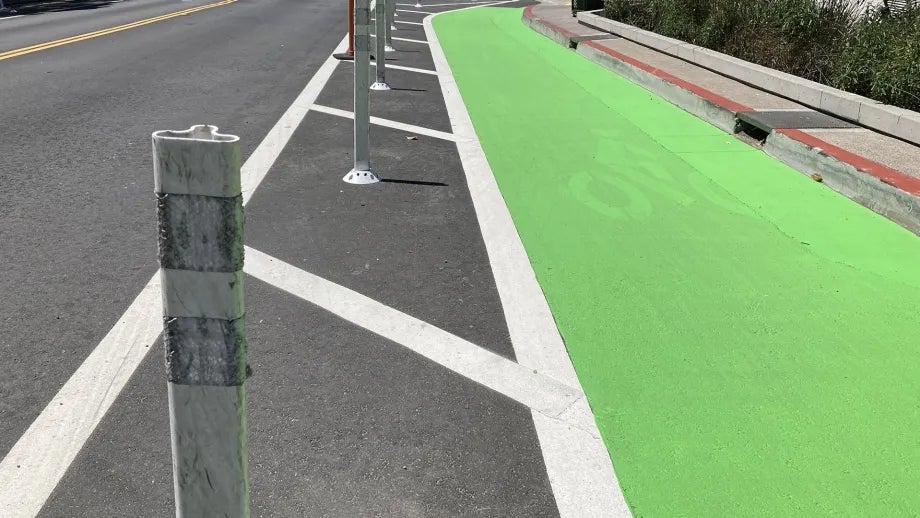Quick-Build Materials
“Quick-Build” materials are cost efficient and readily available materials such as paint, cones, barriers and signage, that a city can use to create safe lanes on streets for people who walk, bike and roll.
“Quick-build” materials allow cities and counties to quickly create safe lanes of traffic for people who are travelling by bike, by foot, by wheelchair, scooter or similar non-vehicle mode.
Giving people safe, active transportation options helps to cut down on vehicle pollution.
A Toolkit of Materials
See MTC’s toolkit of intervention objects and materials that cities in the Bay Area have been using to create physical and spatial boundaries, creating safer spaces for people using the street, including:
- Temporary Points: Colorful traffic cones, flexible bollards, painted points, plastic drum bollards, K-71 bollards, social distance painted points
- Permanent Points: Planter boxes, Armadillo lane separators, metal bollards
- Temporary Lines: Colorful crowd barriers, a-frame signage barriers, jute tubes, type III barriers, social distance line segments
- Permanent Lines: Playful seating, playful fencing, complete streets spacial configurations
- Temporary Planes: Plastic K-Rails/Jersey barriers, barricade covers, haystacks, painted streets, social distance spherical planes
- Permanent Planes: Painted K-Rails, seating and landscape edges, parklets
The Benefits of Quick-Build Materials
Cities and counties can implement complete-street improvements using temporary, light, cost efficient and readily available “quick-build” materials such as paint, cones, barriers and signage.
Unlike long-term capital improvement projects, quick-build implementation timelines are shorter and may include demonstration projects (days to months), pilot projects (months-years) and interim design (1-2 years).
Design testing, flexibility and prototyping are built into the quick-build process so that the improvements are iterative in nature, adjustable and can accommodate community needs.
Staff Contacts
Nicola Szibbo, MTC Principal Engineer
Phone: 415-778-6720
Email: nszibbo@bayareametro.gov
Toshi Shepard-Ohta, MTC Assistant Director
Phone: 415-778-5280
Email: tshepard-ohta@bayareametro.gov
Below are some of the sources of funding for quick-build projects:
- COVID-19 Rapid Response Bicycle and Pedestrian Grant Program
- Active Transportation Program - Cycle 5 Quick-Build Pilot
- NACTO City Grants for Pandemic Response and Recovery
- PeopleForBikes Community Grant Program
- AARP Community Challenge
- Build a Better Barrier Challenge
- Arts & Transportation Rapid Response
Below are some additional quick-build resources:
AARP
Alta Planning + Design
Alta Planning + Design & California Bicycle Coalition
City of Fayetteville, AR
City of Fort Worth, TX
Massachusetts Department of Transportation
Minnesota Department of Transportation
Mobycon
National Association of City Transportation Officials (NACTO)
- COVID-19: Transportation Response Center
- Rapid Response: Emerging Practices for Cities
- Streets for Pandemic Response and Recovery
- Urban Street Design Guide
- Blueprint for Autonomous Urbanism
- Global Street Design Guide
- Urban Bikeway Design Guide
- Transit Street Design Guide
- Urban Street Stormwater Guide
- Bike Share Station Siting Guide
- Designing for All Ages & Abilities
- Don't Give Up at the Intersection
PeopleforBikes
Safe Routes Partnership
San Francisco Planning Department
The Street Plans Collaborative
- COVID19 Livable Streets Response Strategies
- Tactical Urbanism. Vol. 1 – 6
- Open Streets Project
- Tactical Urbanist’s Guide to Materials and Design
- Fast-Tracked. A Tactical Transit Study
- Asphalt Art Guide

